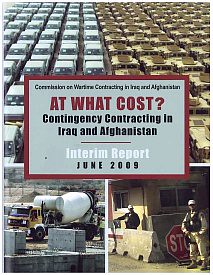Wartime Contracting Commission Warns Congress of Potential Significant Waste
by Gary Therkildsen*, 6/11/2009

At a House Oversight and Government Reform subcommittee hearing yesterday morning, members of the Commission on Wartime Contracting in Iraq and Afghanistan provided an interim report warning of potential contracting waste, fraud and abuse during the future drawdown of U.S. troops in Iraq and subsequent surge in Afghanistan.
Co-Chairs Michael J. Thibault, a former deputy director of the Defense Contract Audit Agency, and former Rep. Christopher Shays (R-CT), felt they could not wait until next year's due date for the commission's findings, and deemed it necessary to come before the National Security and Foreign Affairs Subcommittee to urge action on several issues. Some of the matters requiring immediate attention, according to Thibault and Shays, include:
- Increasing the number of qualified contract-management personnel in theater – there is a critical shortage of contracting officer's representatives (CORs), members of the military designated to oversee contractor performance in country.
- Reforming the process of choosing and training CORs – according to an anecdote told to Thibault, selection as a COR can come down to a game of "not it" within a unit, and online training can be maddeningly prohibitive in remote parts of Iraq and Afghanistan.
- Quicker transition from Logistics Civil Augmentation Program (LOGCAP) III to LOGCAP IV – the government awarded LOGCAP III, the main channel for contractor support of the military in theater, solely to KBR in 2001, whereas DOD competitively divides LOGCAP IV between KBR and two other contractors, helping to reduce taxpayer costs.
- Greater oversight of subcontractors working in theater – 70 percent of contracts are subcontracted out, but the government cannot access information on the subcontractors without going through the prime contractor, limiting accountability.
- Establishing a contracting oversight command in Afghanistan – despite the expectant surge of troops in Afghanistan, the military oversees Afghan contracts from Iraq, limiting the ability of personnel to monitor Afghan contract performance.
Due in part to the negligence of contractors, there has already been a significant waste of resources and even unnecessary deaths. Now the United States is in the process of drawing down its forces in Iraq and adding significant numbers of troops in Afghanistan, creating the potential for even more waste and abuse. The question is, of course, will these circumstances prompt Congress or the Defense Department to act?
According to the commission's interim report, oversight and other governmental bodies, including the Government Accountability Office, the Congressional Research Service, and myriad inspectors general, have made close to 1300 recommendations since 2001 in an effort to improve the wartime contracting process. Congress and the military have acted upon very few of these. One of the tasks of the commission is to study these suggestions, synthesize them and incorporate them into their own recommendations. One can only hope that, unlike the previous reports and reform proposals, the commission's work does not sit on a shelf and collect dust.
Image by Flickr user johnsolid used under a Creative Commons license.



